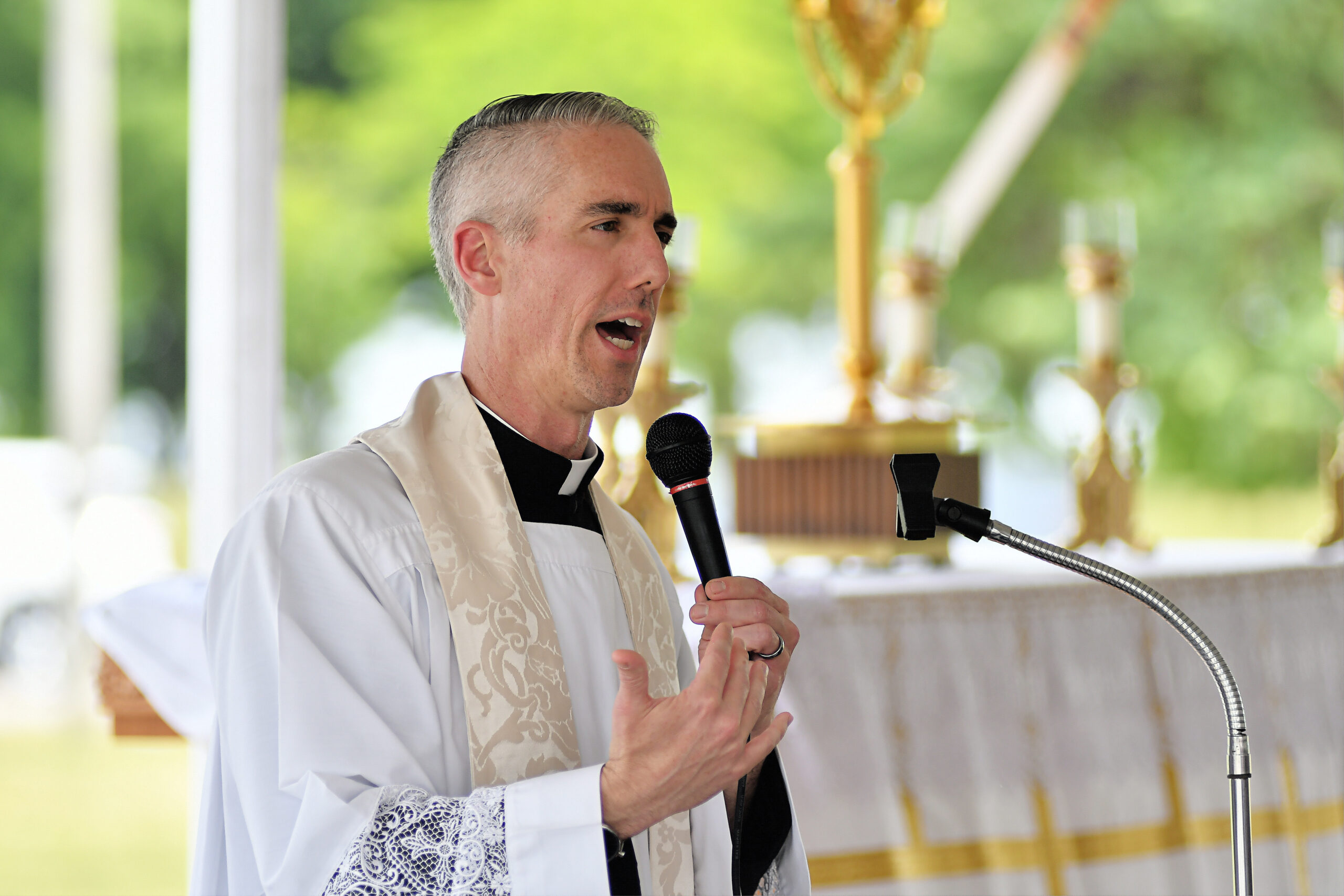
Fr. John Burns speaks at a Holy Hour held in a Eucharistic Tent at the Archdiocese of Milwaukee Eucharistic Congress held June 10 at the Mary Mother of the Church Pastoral Center in St. Francis. (Photo by David Bernacchi)
God can use the Eucharistic Revival to transform parishes and more only if we first welcome him to live in our hearts completely.
Fr. John Burns, one of 50 National Eucharistic Preachers for the ongoing three-year National Eucharistic Revival, delivered this message at the Archdiocese of Milwaukee Eucharistic Congress. About 600 people attended the gathering held at the Mary Mother of the Church Pastoral Center in St. Francis on June 10.
The congress concluded a year of revival at the archdiocese level while it also kicked off a year of revival at the parish level.
“Maybe that should be a daily prayer for us in this year of parish revival — ‘God, set a fire in me. Put the fire of your heart into my heart and bring that heart, that fire, that fervor, that Eucharistic love, right back to the middle of everything in the Church, God, so that we would not become confused about anything else.’”
Fr. Burns, an Archdiocese of Milwaukee priest who works in vocations ministries for men and women and has published three books with Ave Maria Press, preached during a Holy Hour set under a large tent.
He said we must abide in God completely as we root our faith in things we cannot see with our eyes, but know to be true, such as the Real Presence of Jesus in the Eucharist.
“If there’s a roadmap, an action plan, a strategy for the year to come, for the years to come, for our lives to come, let’s let it be that we would hold back nothing of ourselves for ourselves … so that he who gives himself to us entirely can actually receive our lives and our Church entirely,” Fr. Burns said. “He does not assert himself upon you, or upon our people, upon our parishes, upon our Church and upon our world. He just presents himself to us. It is an invitation.”
The Eucharistic Revival was established by the United States Conference of Catholic Bishops after a 2019 Pew survey found that only one-third of Catholics believe in the Real Presence of Christ in the Eucharist.
“So it frankly comes down to, in a revival, not just to what we do in our parishes — what the booklets look like, and the pamphlets and the videos — but it comes down to the people, you and I, and how we are praying. Whether we are willing in the deepest places to become so familiar with God that people believe he is sustaining us by a power beyond our own powers. There is no limit to what he can do,” Fr. Burns said.
“Each of us, every single day — this is our revival, actually — if every single one of us begs for the grace to live what is actually true, and to be unafraid of its implications,” he said. Those implications are that we will not be popular, live “flashy” lives or have or do things the world says we need to be happy.
“That’s a cost for sure, but as we beg God for the grace not to be afraid of that cost, he brings with it a grace by which we are more deeply convicted that this world is not the whole story,” he said.
Fr. Burns described Catholics as “pilgrims” living with a heaven that is on the horizon but also “somehow mysteriously” in the present, too.
“To live a Eucharistic life is to be unafraid to always live in the presence of God and to let every moment — in church, at Adoration, at Mass — be a moment in which we beg the Lord, ‘Help me to remember what is going on here has to shape what is going on out there or I will continue in the ways of the world,’” he said.
Fr. Burns described both the world and the Church as broken.
“Jesus, the world that’s falling apart and the Church that’s all messed up, that’s your problem,” Fr. Burns said.
When the audience responded with a chuckle of relief, he quickly added, “I’m not kidding. It’s his problem to fix, but he’s called us to be believers now. It is up to us to consent to his activity and to run with it. He has given himself to us in the Eucharist so that we do not run alone, that we do not problem-solve alone, that we do not worship alone, that we do not live alone,” he said.
“God will not do that work without us, but we do not do that work without him.”
